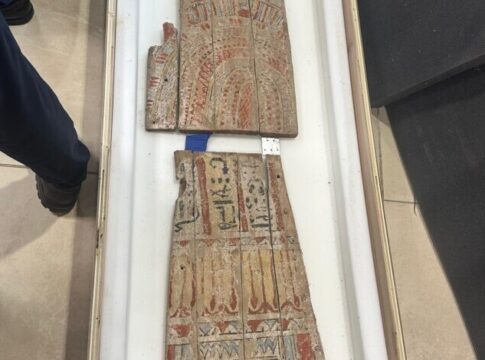In a powerful testament to diplomacy and perseverance, Egypt has successfully repatriated 25 looted antiquities from the United States, concluding a three-year legal and diplomatic effort that spanned continents and courtrooms.
The recovered items—ranging from gilded coffin lids and Greco-Roman portraits to gold coins and temple fragments—were formally handed over to Egyptian authorities in Cairo this week. The retrieval operation was led by the Egyptian Consulate in New York, working closely with the Manhattan District Attorney’s Office, US law enforcement, private collectors, and international prosecutors.
“This is not just a return of objects—it’s a restoration of memory, culture, and national dignity,” said Mohamed Ismail Khaled, Secretary General of the Supreme Council of Antiquities.
Among the treasures now safely back in Egypt are:
- A rare Fayum mummy portrait, celebrated for its haunting lifelike realism and dating back to the Greco-Roman era.
- Gilded and ceramic funerary masks, reflecting intricate burial rituals.
- A fragment of a granite foot from circa 1200 BCE.
- Temple pieces believed to originate from the reign of Queen Hatshepsut, one of ancient Egypt’s most powerful female pharaohs.
- A gold coin from the Ptolemaic dynasty, likely struck during the rule of Ptolemy I.
- Several items made from ivory and alabaster, prized materials in ancient Egyptian art.
“None of these were stolen from museums,” Khaled clarified. “They were illegally excavated and smuggled abroad—often passed through the hands of private dealers under false provenance.”
The artefacts were returned following an in-depth investigation led by US authorities, with the Manhattan District Attorney’s Office playing a key role in identifying and seizing the objects from galleries and collectors who either knowingly or unknowingly possessed looted works.
The formal handover was overseen by a joint Egyptian committee from the Ministries of Foreign Affairs and Tourism & Antiquities. The artefacts will now undergo restoration at the Egyptian Museum in Tahrir, before being showcased in a temporary exhibition.
“This is one of the most significant antiquities recoveries of the past decade,” said Shaaban Abdel Gawad, head of Egypt’s Antiquities Repatriation Department.
“It reflects Egypt’s growing ability to use international law and diplomacy to reclaim our stolen legacy.”
Since 2022, Egypt has aggressively scaled up its efforts to track and retrieve looted antiquities—much of which were stolen during periods of political unrest or through unauthorized excavations in remote sites.
The country’s campaign forms part of a broader global trend, with UNESCO and INTERPOL increasingly supporting nations in retrieving lost cultural heritage. However, Egyptian officials stress that thousands of artefacts remain unaccounted for, scattered across auction houses, private collections, and museum storage rooms.
Tourism Minister Sherif Fathy praised the recovery as a “model of cooperation between nations.”
“This achievement reflects the unified will of Egypt’s institutions to protect our history, identity, and future,” Fathy said at the ceremony.
According to Sources in Cairo’s Ministry of Antiquities, Egypt is currently in active talks with two European museums and a private Middle Eastern collector over the return of additional high-value items believed to have been exported without proper documentation.
A ministry official, speaking on condition of anonymity, confirmed that legal notices have already been filed in at least one EU jurisdiction, setting the stage for a possible second wave of returns later this year.
Egypt also plans to expand its Antiquities Tracking Unit, currently housed within the Ministry of Foreign Affairs, to include digital tracing tools, artificial intelligence for provenance verification, and closer ties with major auction houses and cultural watchdogs.
The recovered artefacts, some of which had been missing for decades, are more than museum pieces—they are fragments of a living heritage.
“Every object that returns tells a story not only of the past, but of Egypt’s determination in the present,” said Dr. Heba Mostafa, an archaeologist at Cairo University.
“They remind us that history may be old—but it is never forgotten.”
As Egypt continues its fight to reclaim its scattered cultural wealth, this latest victory sends a clear message: the guardians of the ancient world are no longer silent.


